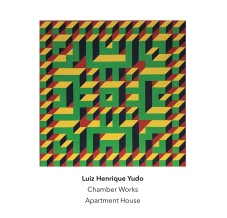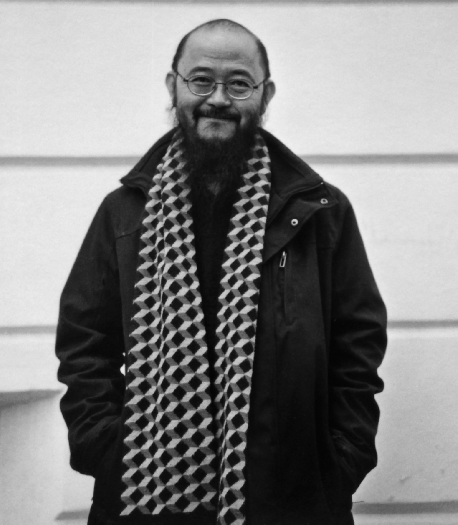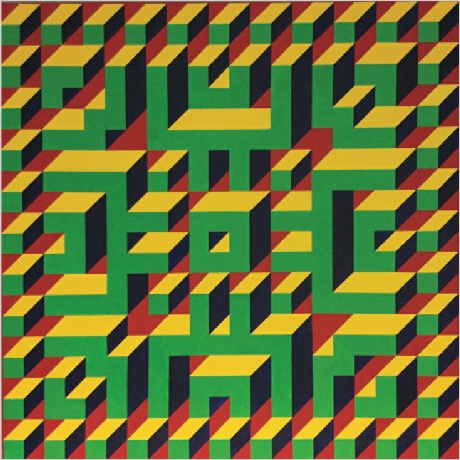Another Timbre TimHarrisonbre

at150 Luiz Henrique Yudo ‘Chamber Works’ - Apartment House
Five chamber works by the Brazilian/Dutch composer Luiz Henrique Yudo, realised with brilliance by Apartment House. Each piece is the transcription into sound of a visual work of art.
1 - A QUARTET FRO FRANCOIS MORELLET (2012) 8:10
2 - A QUARTET FOR CHRIS BEEKMAN (2017) 9:11
3 - A QUARTET FOR PALLADIO (1998) 4:09 youtube extract
4-8 FIVE PALINDROMES (1997) 10:54
9 - THE DONALD JUDD HARMONIES (2016) 34:54 youtube extract
Interview with Luiz Henrique Yudo
Could you tell us about your background, and how you became involved with experimental music?
Background:
Trained as architect, worked as art-director at an advertisement agency and briefly
as a fashion designer. Film studies while working as a freelance illustrator, painter
and sketcher. Later working in a museum.
No background in music: auto-didactic, outsider.
Experimental
music:
Music coming from structures, labyrinths, alphabets, codes, patterns, architecture,
paintings, drawings, sculptures, displays, textiles, numbers, geometry, tables, anything
visual with a sonic potential.
Conclusion:
Visual perception, sound solution.
How do you go about turning a visual object into a score?
It is just a personal way of composing. It was not taught by anyone. It is a trained awareness that brings satisfying results.
Where did you grow up, and where do you live now?
Born and grew up in the countryside of Brazil, university studies in São Paulo city, later moved to Europe: first Paris and now living in Amsterdam.
While your scores usually present the musicians with a definite and clear structure, you often leave it to the musicians to choose some of the crucial details of how the music will actually sound. Can you explain why you do this, and does it sometimes lead to disappointments?
It is a game of responsibilities. The composition is constructed in such a way that it has its own identity. Some details are deliberately left open, so that the musicians can imprint their own personalities on the music they are performing, without compromising the identity of the composition. It is a nice way to produce music that can surprise again and again in each new performance. It is never aleatoric, it is just open. It could lead to disappointments, but only if the musicians did not correctly understand the instructions of the composer.
Interview with Apartment House’s Anton Lukoszevieze
What drew you to want to play Yudo's music?
I remember discovering his name floating about in the general experimental music world and then I performed his FIVE PALINDROMES with Tim Parkinson for MWLTH. I then contacted Luiz who was very kind and gracious in sending me scores. After that Apartment House began to perform his music and I was hooked. What drew me in was the sheer eloquence and beauty of the works that I heard, before having actually seen the scores, which are in themselves works of art.
How do most of Yudo's scores work?
Often Luiz writes in the score exact rhythms and a limit of pitch materials that you as a performer may choose. For example in A QUARTET FOR PALLADIO each of the 4 instruments may only use 4 pitches or ‘sounds’, which are assigned to precise rhythms. This rhythmic element is thus derived from the original Palladio drawing, by Luiz. In other works such as the FIVE PALINDROMES, each instrument may only use 2 pitches/chords/sounds, but can change one of them (or not) after a period of time. So then one can hear clear changes in the texture and harmonic content of the music. Sometimes the tempi of works is free (as in the 5 Palindromes), though at times in other works Luiz will give a metronome marking or temporal suggestion for how fast or slow the music should be. In THE DONALD JUDD HARMONIES I-XXIII he asked for a very slow tempo, which does seem to mirror clearly the visual nature of the Judd colour forms that the music is derived from.
Our task as a group is to make things sound good, which of course is highly subjective! In rehearsal we make group or individual decisions as to what pitch or sound material we use for each piece. Therefore often, before we start a work we have no idea what it will sound like! If we think something is not quite right, we will make small changes and discuss it. It can be as simple as suggesting a different tempo, some higher or lower pitches, more chords, or more percussive sounds, etc.
One basic tenet I have is that each work should have its own character or sound world. This can often be defined by the choice of instruments, I like a variety or a similarity. Some works such as A QUARTET FOR PALLADIO demanded for me a complex mix of sounds (on the recording this is percussion playing flower pots, bowed viola, prepared cello playing pizzicato and synthesiser keyboard.) Other works demand a more homogenous texture and sound world, such as THE DONALD JUDD HARMONIES I-XXIII. In choice of pitch one need not adhere to an equal tempered tuning of course, so in some works (A QUARTET FOR CHRIS BEEKMAN) some of the instruments are de-tuned, creating a very distinct sound world. For THE DONALD JUDD HARMONIES I-XXIII one has to choose a gamut of pitches that are then used for the entire work. I chose a gamut consisting of ascending perfect 4ths, which then become perfect 5ths, as these seemed to create harmonies that had a purity and, somehow, a poetic connection to the Judd colour forms.
There does need to be a certain degree of commitment and empathy when preparing and performing all kinds of experimental music, so a dedicated and creative approach does aide the realisation of Luiz’s works and the beauty for me is in the infinite musical possibilities and potential that lie there in them.

Luiz Henrique Yudo, photograph by Anton Lukoszevieze

‘A QUARTET FOR PALLADIO’ by Luiz Henrique Yudo - the painting on which the score of the piece of the same name is based.